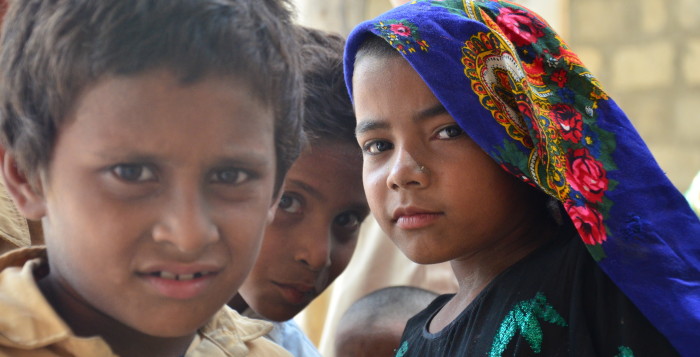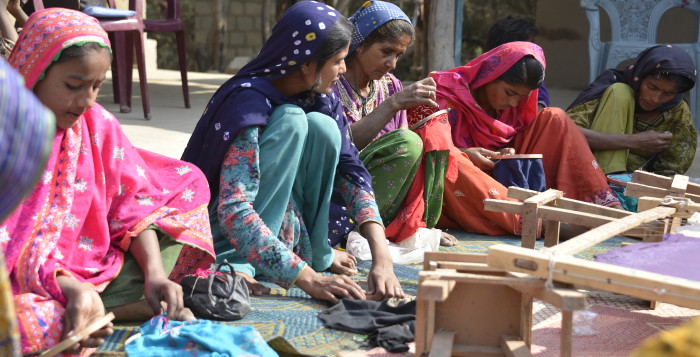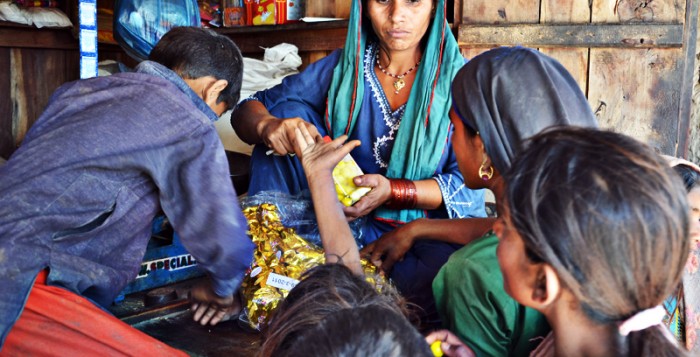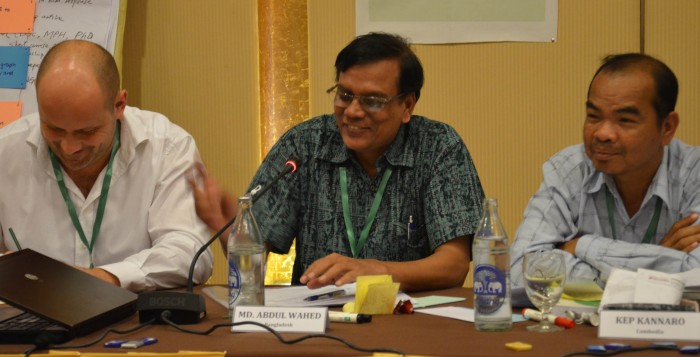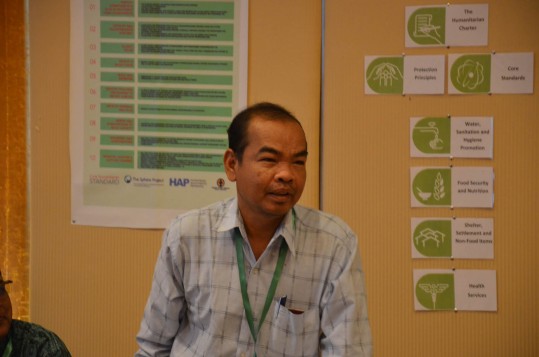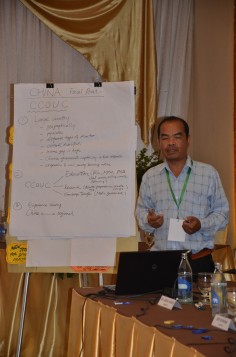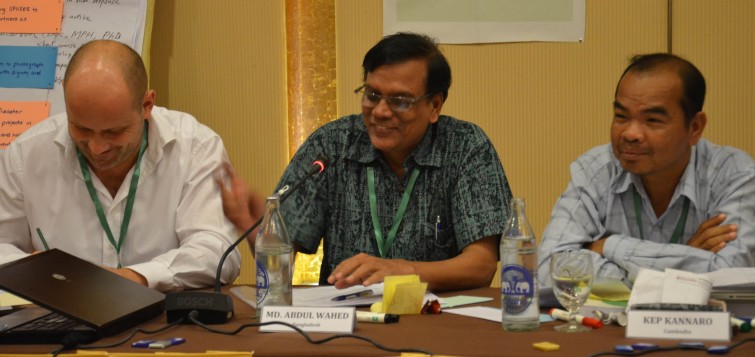| Duration | Apr 01, 2015 — Mar 31, 2018 | |
| Location | District Umerkot, Thatta, Sindh Province | |
| Key Activities |
| |
| Participants | 700 women in vocational training 3,080 immediate and 7,560 extended household members benefitting from increased income 1,400 men and community members benefitting directly from gender sensitization activities 3,450 community members sensitized on gender issues through Gender Action Groups |
Capacity Building
Humanitarian Livelihood Assistance to Conflict Affected Families of District Kohat
| Duration | Jun 01, 2014 — Nov 30, 2014 | |
| Location | Kohat, Khyber Pakhtunkhwa Province, Pakistan | |
| Key Activities |
| |
| Participants | 50 men and 225 women heads of households representing 275 families or 1,790 individuals |
Vocational Training and Market Development Program
| Phase | Phase One — Phase Two | |
| Duration | Sep 07, 2014 — Sep 06, 2015 | |
| Location | Mansehra and Haripur Districts (Afghan Refugees Camps and surrounding host community) | |
| Key Activities |
| |
| Participants | 360 (240 male and 120 Female) Training participants 270 Previous male graduates: Marketing/linkages: 370 (100 women and 270 men): Refresher/advance training: 216 (100 women & 116 men): Employment/linkages of newly trained graduates 240 Women: Enterprise development training 20 (10 men and 10 women): Small medium enterprises 100 Graduates (men): Linkages/employment in Afghanistan 30 Graduates (women): Exhibition |
Vocational Training and Market Development Program
| Phase | Phase One — Phase Two | |
| Duration | Jul 01, 2010 — | |
| Location | Mansehra and Haripur, Khyber Pakhtunkhwa Province, Pakistan | |
| Key Activities |
| |
| Participants | 1,005 male Afghan refugees and members of host communities 510 female Afghan refugees and members of host communities |
I now play an important role in my family’s livelihood. We spend most of this money on nutritional needs and also health and clothing needs…I will invest some of the net profit in order to make my business more stable and productive.
Majid Khan, vocational training participant who opened his own business
Provision of Preventive and Curative Health Care Services to Afghan Refugees (Mansehra Health Project – MHP)
| Duration | Jul 01, 2013 — Jun 30, 2014 | |
| Location | Mansehra, Khyber Pakhtunkhwa Province | |
| Key Activities |
| |
| Participants | 60,000 Afghan refugees |
When I was a child, I received vaccinations from CWS-P/A’s basic health unit and visited the BHU when I was sick. It was my dream to become a doctor and help my community. I really liked the vaccination and awareness programs, which is why I wanted to work and am still here eleven years later as a medical officer.
Dr. Wali Jan, a doctor with Community World Service Asia’s health program
Mother and Child Health Center
| Duration | Aug 01, 2012 — | |
| Location | Thatta District, Sindh Province, Pakistan | |
| Key Activities |
| |
| Participants | 20,504 community members (population of Union Council Bijora, District Thatta) |
I am very happy with the support of CWS-P/A; they have saved my baby…They have properly guided me for nutrition and care of my pregnancy.
Noor Jahan, MNCH patient
If this center would not have existed, I couldn’t have accessed treatment from any hospital due to my poor economical situation. No doubt CWS-P/A has saved my life.
Muhammad Mallah, MNCH patient
Alleviating Poverty through Women’s Empowerment and Livelihoods Development with a Disaster Resilient Approach
| Phase | Phase One — Phase Three | |
| Duration | Jan 01, 2015 — Dec 31, 2015 | |
| Location | Thatta, Sindh Province, Pakistan | |
| Key Activities |
| |
| Participants | 4,700 women from rural communities |
After getting admission in the adult literacy center, I used to teach my daughters. My daughters were inspired when they saw me go to school with my bag. Now, they are motivated for education, and I have admitted them into the local school.
Saima, a project participant
After the 2010 floods, I have worked with different NGOs/INGOs. The way CWS-P/A works for sustainability is genius. We like working with them. Other organizations have given shelter, etc, but then they leave. These vocational skills will never die and will trickle down to our children.
Samoon, President of the Village Organization in Ghulam Mohammad Soorjo
We were very glad to see that our embroidery work can be sold in the market. I saw a hand bag for Rs. 300 (USD 3). I didn’t know these small handbags could be expensive. After the first visit, I came back and shared about the differences in cost here and in Karachi.
Bejum Jan, participant in the exposure visit to Karachi
Alleviating Poverty through Women’s Empowerment and Livelihoods Development with a Disaster Resilient Approach
| Phase | Phase One — Phase Three | |
| Duration | Jan 01, 2015 — Dec 31, 2017 | |
| Location | Thatta, Sindh Province, Pakistan | |
| Key Activities |
| |
| Participants | 2,300community members |
After getting admission in the adult literacy center, I used to teach my daughters. My daughters were inspired when they saw me go to school with my bag. Now, they are motivated for education, and I have admitted them into the local school.
Saima, a project participant
After the 2010 floods, I have worked with different NGOs/INGOs. The way CWS-P/A works for sustainability is genius. We like working with them. Other organizations have given shelter, etc, but then they leave. These vocational skills will never die and will trickle down to our children.
Samoon, President of the Village Organization in Ghulam Mohammad Soorjo
We were very glad to see that our embroidery work can be sold in the market. I saw a hand bag for Rs. 300 (USD 3). I didn’t know these small handbags could be expensive. After the first visit, I came back and shared about the differences in cost here and in Karachi.
Bejum Jan, participant in the exposure visit to Karachi
Alleviating Poverty through Women’s Empowerment and Livelihoods Development with a Disaster Resilient Approach
| Phase | Phase One — Phase Three | |
| Duration | Sep 01, 2012 — Aug 01, 2013 | |
| Location | Thatta, Sindh Province, Pakistan | |
| Key Activities |
| |
| Participants | 4,700 women from rural communities |
After getting admission in the adult literacy center, I used to teach my daughters. My daughters were inspired when they saw me go to school with my bag. Now, they are motivated for education, and I have admitted them into the local school.
Saima, a project participant
After the 2010 floods, I have worked with different NGOs/INGOs. The way CWS-P/A works for sustainability is genius. We like working with them. Other organizations have given shelter, etc, but then they leave. These vocational skills will never die and will trickle down to our children.
Samoon, President of the Village Organization in Ghulam Mohammad Soorjo
We were very glad to see that our embroidery work can be sold in the market. I saw a hand bag for Rs. 300 (USD 3). I didn’t know these small handbags could be expensive. After the first visit, I came back and shared about the differences in cost here and in Karachi.
Bejum Jan, participant in the exposure visit to Karachi
Developing Capacity for Sphere in Cambodia
Developing a strong network, where each organization can learn and apply the Sphere standards to improve their humanitarian accountability is one of Mr. Kep Kannaro’s goals. Kannaro, the new Sphere Focal Point for Cambodia, is also the Cambodian Humanitarian Forum’s (CHF)[1] Chairperson and Executive Director of Partnership for Development in Kampuchea (PADEK).
In 2011, Kannaro participated in CWS-P/A Sphere training for the first time. Shortly afterward, Cambodia experienced massive floods. He immediately initiated an emergency response proposal, integrating the Sphere standards. “It was very difficult to put into practice,” admitted Kannaro. “We’ve been blamed for not responding as quickly as we should because of time taken by the assessments. However, the results were positive and the donors were really satisfied.”
Convinced about the potential of the Sphere standards and the importance to enhance quality and accountability of humanitarian response in Cambodia, Kannaro wanted to enhance the expertise of the Cambodian civil society organizations.
In 2012, with the support of USAID Office of Foreign Disaster Assistance (OFDA) and Asian Disaster Preparedness Center (ADPC), Kannaro created the Cambodian Humanitarian Forum, a network of national organizations dedicated to strengthening emergency response capacities of national organizations. Since its creation, CHF has organized several capacity building initiatives, including Sphere standards trainings, and established an information and resource-sharing center.
CWS-P/A approached CHF this year based on a consultative process with some Cambodian organizations about the possibility of having a Sphere Country Focal Point in Cambodia. CHF accepted this role. As Chairperson of CHF, Kannaro took it as an opportunity to learn from his peers in the region and to transfer the acquired knowledge to his Cambodian counterparts.
“Awareness has increased and standards are more integrated in their emergency response after the training given by the forum.”
Today, Kannaro is proud of the progress made by Cambodian non-profits who benefited from the trainings. “Awareness has increased and standards are more integrated into their emergency response after the training given by the forum [CHF].” He also emphasized the challenges ahead. Despite the progress, he admitted, “Not many organizations are aware about the Sphere standards, and we also need to work closely with the government to mainstream those standards into the humanitarian response.”
Kannaro is enthusiastic about how the Sphere standards positively impact humanitarian response. His goal is to advocate for a proper disaster response law that would integrate the minimum standards. “If we can integrate standards in the law, more NGOs will apply them.” With a smile and positive outlook, Kannaro concluded, “It will be difficult, but we can make it.”
Kannaro and CHF exemplify of how capacity building and an effective networking platform can strengthen the promotion and application of the Sphere standards in humanitarian programs. They also demonstrate the importance of having Sphere champions, the ones who can inspire, empower, and engage more organizations for improving humanitarian effectiveness and enhancing the quality of aid delivery to the communities.
In October 2014, Kannaro was among ten Sphere country focal points who participated in the Sphere Focal Point Forum in Bangkok, Thailand. The event encouraged candid discussion, peer learning, and joint advocacy while enabling a sense of community among Sphere practitioners across Asia. Speaking at the event about his role as the Sphere Country Focal Point, Kannaro shared, “My vision for the future is promoting awareness and the ability to apply Sphere among the network [CHF] members; secondly, to work with government line departments and ministries to integrate Sphere standards into disaster management law; and thirdly, to work together to apply and build awareness among community members so they know about the assistance they are receiving.”
[1] CHF is a network of national NGOs and civil society organizations working in Cambodia which aims to improve humanitarian actions for saving lives in communities during emergency through capacity building and training, accountability, coordination and cooperation, and quality humanitarian standard. http://www.chfcambodia.net/
As the Sphere regional partner in Asia, Community World Service Asia supports the promotion and implementation of the Sphere standards training, Q&A deployments, technical support, and events such as this forum. In collaboration with The Sphere Project, we organized the Sphere Focal Point Forum, twice, in 2011 and in 2014. This year’s Forum was jointly financed by The Sphere Project, Diakonie-Sweden, Act for Peace and Community World Service Asia.





